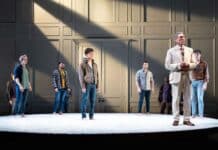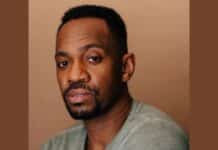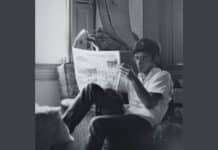There’s an alternate universe of reasons to see A Wrinkle in Time, the musical adaptation of Madeleine L’Engle’s beloved classic now playing at Arena Stage. As my colleague Sophia Howes wrote in her review, the production is “sumptuous, original, and full of visual and aural delights.”
A Wrinkle in Time is also, notably, a “girl-powered” musical — the central protagonist is Meg, a girl in seventh grade, and the show has an all-woman creative team (book by Lauren Yee, music and lyrics by Heather Christian, directed by Lee Sunday Evans, choreography by Ani Taj). It was in this rarefied context that a particular performance stood out for me: Nicholas Barrón as Calvin, a 14-year-old basketball player who befriends Meg. What struck me was that contrary to all the misogynist precepts of the malignant manosphere into which such a teen’s conscience might today vanish, Calvin, in Barrón’s sensitive portrayal, appears the very model of a boy who on principle could be a true friend to a girl. Intrigued, I asked to talk with Barrón about that, and he generously opened his heart (over Zoom, in a conversation here edited for length and clarity).
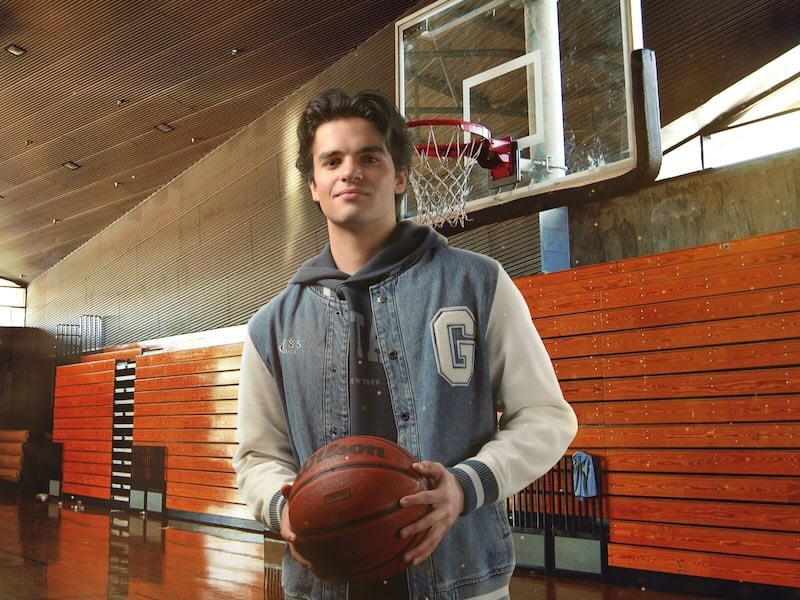
John Stoltenberg: What impressed me about your performance in A Wrinkle in Time was your charismatic expressivity. It was extraordinary.
Nicholas Barrón: Well, thank you so much.
You seemed to emanate a glow of animate emotion from within. And the character you made real, that teenage basketball star Calvin, fascinated me. Throughout your performance, your character is movingly and transparently supportive of Meg and her quest to find her father, a brilliant scientist who’s lost in the fifth dimension. And we, the audience, can read Calvin’s faithfulness, loyalty, and dedication in every flicker of your face. To my mind, Calvin comes across as an exemplar of how a boy can be a solid friend to a girl.
I totally agree.
And I was curious to know: how does an actor-singer of your caliber create such an indelible character in an original show? So let me begin by asking: who is Nicholas Barrón, and how did you get to the Arena Stage in DC?
I was born and raised in San Antonio, Texas. I lived there my entire life until I went to college. I found myself and found what I love to do in community theater. I hadn’t really played sports much growing up. I was trying to find a place to put all my energy. I think my parents were trying to find that too, so they put me and my two older sisters into theater. I did Fiddler on the Roof when I was nine years old. I fell in love with it and since then I’ve been performing in any show or any gig or any singing thing that I could get my hands on because I discovered that it was what I loved to do so much, and it made me feel so amazing. And I discovered a little later that, like, oh, I’m actually kind of good at this. I could make something of this.
In high school, I competed in my regional program for the National High School Musical Theatre Awards, the Jimmy Awards. And that in itself was such a crazy experience. I was there with almost 100 other kids who had just competed in the same thing that I had. And they were so talented and so kind and so sweet. And I was lucky enough to win the [2022] Jimmy Award [for Best Performance by an Actor], which was crazy. I mean, as a theater kid, you don’t expect that to happen. I was so shocked but so, so excited about it. And it opened up so many new opportunities for me.
I finished my senior year online so I could move to New York and start auditioning. I trained as an operatic tenor for a year and loved it. And pretty soon after that, I booked the revival of Ragtime at New York City Center. I was in the ensemble, and I understudied Younger Brother. That’s coming to Broadway this spring, which is very exciting. And I’ll be doing the same role, which I cannot wait.
That was such a formative and beautiful, crazy experience. It was my first professional contract, and I felt so lucky to be there and also so terrified, and that was my experience coming into Arena Stage. I went in for the show [A Wrinkle in Time] in December. I didn’t know until I got into the audition room how special, different, and weird it was. Singing the music in front of the creative team for the first time was exciting, surprising, and special. I got the call right before March that I had booked Calvin, and I was so excited, and I’ve been here for two months now working on the show.
What’s the rehearsal and performance experience been like for you here?
It’s been really, really wild. I’ve never done a brand-new show before. It was like a living, breathing thing. It was very, very cool. And I think we made something pretty spectacular with it.
What was your first take on Calvin, and who is he to you?
I was honestly intimidated by the idea of creating a character out of thin air. The book, the adaptation, was what I went by the most. And given the script, I wanted to create a character that felt human and relatable and fun and supportive, like you said. His support is such an important and driving force in Meg’s story; I wanted that to come across more than anything. So much of what you see from Calvin, I developed in rehearsal and in performances, like this humor he has — and these complicated, maybe romantic, maybe just very, very sweet and pure friendship feelings he has for Meg. We didn’t quite know where those were going to land in rehearsals. And so, really being able to find his sensitivity and his warmth has been the most important thing for me to be able to craft this character in the way that I have.
What is A Wrinkle in Time about from the point of view of Calvin?
I was asked a similar question in a talkback. We had a bunch of middle schoolers, and I said I think it’s about finding the parts of yourself that you thought were problems or negatives and harnessing them to their full power and making them something beautiful, something to be proud of, and using your faults as your gifts. Calvin is able to observe that in Meg, but he’s also a character who starts with this gift of communication. He has this warmth. He has this humor. He has the gift that Meg doesn’t have of getting people to like him and having that charm.
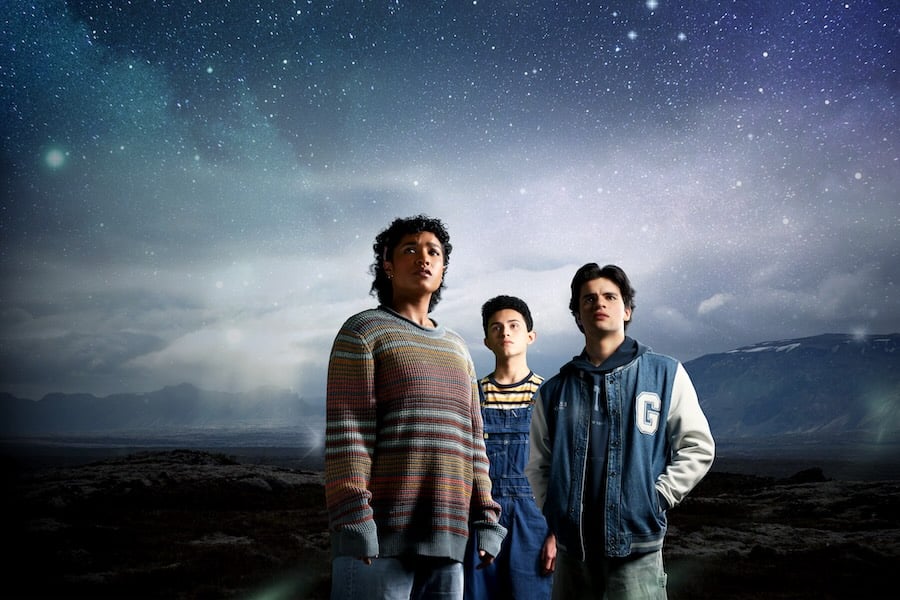
Can I tell you when I first started to like him?
Please, yeah.
Very early in the show, there’s this point where Meg and Calvin first meet. It’s a basketball practice. And Calvin offers to be her partner when no one else wants to. Then he admits and admires that she knows the answers in math.
Yeah.
What did that mean to you to say you were breaking ranks with the team members who wouldn’t step forward, and you were admiring her math skills? I thought that was the most perfect beginning for a character arc.
Yeah, it’s so special. So many people see themselves in Meg, as so many people have felt like an outsider, like they don’t really belong. And I think what we all wish would happen is the best-case scenario of somebody coming up to you and just being a human being with you and being honest with you and being open with you.
I think that that’s what Calvin is able to give Meg in that moment. And I love the way that Taylor [Iman Jones] plays it. It’s so brilliant because she’s like, why are you doing that? That’s not the way things work here. I think it does very smartly establish Calvin as a character who is going to break ranks a bit. But also, he sees it as an opportunity to get to know somebody better beyond this surface level of, oh, I play basketball, and I’m new, and you all like me for one reason or another.
Calvin says he has “compulsions.” How do you understand that?
I think it’s this overwhelming idea of believing that he’s right for wanting to take action. That’s a very powerful thing to write from a children’s point of view. When I was 14, I don’t feel like I took any of my feelings as seriously as these three kids do [Meg, her brother Charles Wallace, and Calvin]. I was like, I’m just a kid, and what can I do? And what action am I gonna take that’s really gonna change things? Everything feels so big when you’re that age; everything feels so monumental. But it’s hard to trust yourself. And I think that Calvin is such a great example of believing in the things that he feels. Which I also think is so huge for young boys to see. And I think that Calvin truly being a character of emotions and feelings and deep internal thought is so special. And very different, honestly. I think it’s a brave approach to take for a 14-year-old character who’s a boy. And I’m so glad we went that direction. And I’m glad that I get to play that.
So much of Calvin in the show is clearly coming from you. I read the script, and we don’t learn a lot about Calvin from it. He asks a bunch of plot-clarifying questions, which is appreciated, but the point at which he takes effective action is one big moment when he dramatically intercedes in the story on Meg’s behalf. He says, “Meg will die if she doesn’t get help, so let me try.” And he communicates with the Beasts. That’s Calvin’s big scene — where everything you’re talking about comes to fruition in terms of acting on his feelings and compulsion and his intuition and being brave.
Yeah, what I love about that arc and Calvin finding his strength there is that it all comes back to words for him. It all comes back to communication and being able to express himself in a way that others understand him, which I think is something that Meg struggles with so much. And to have him have all of these tools and not quite know how to use them. I think being given this challenge of, all right, most people in my life seem to like me, seem to understand some surface level idea of me, and I’m able to exist in this world pretty easily by other people’s standards. How do I use these tools to overcome the biggest hurdle I’ve ever had in my life, which is talking to these nine-foot-tall Beasts that are coming at me and don’t speak my language?
The way I initially approached that was like, I think this is the first time Calvin has been scared in this story. And then as we got into rehearsals and as we were working that scene and the scenes around it, I was like, no, no, no. I think it’s important that all the kids are acting as children and are afraid of these big new things all the time. He’s afraid to be on a different planet. He’s afraid to see these new people, to have these scary workers in your face trying to find important information on a strange new planet. I think that his experience with the Beasts is his most important moment of being afraid in the show. Because it’s the moment where he decides that his love for Meg and his desire for connection is stronger than his fear. And I think that that’s such a beautiful way to write an arc, and I found a lot of joy and meaning in playing that, because I think it’s so unique, so special.
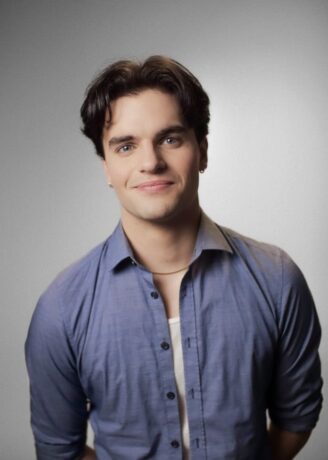
In an interview you did a couple of years ago with Raven Snook, you were open about your physical disability, and I’d like to ask if you would be okay talking about it.
Sure, absolutely.
To my mind, the incidental fact of your physical disability only deepened what seemed so profoundly noble and exemplary about your portrayal of Calvin. Have you thought about that, and were there discussions about that?
Yeah, there were very thoughtful discussions at the very beginning of the process, looking at how that played, between me and our amazing director, Lee Sunday Evans, and we talked about how, as you said, this incidental factor would play into Calvin. In my work and in the characters that I play, I like for my disability to be an afterthought or not a thought at all. I think that trying to fit my own individual lived experiences into a character that has nothing to do with me beforehand is tough. It’s a lot of energy spent on something that I don’t find to be too important.
You know, I think that people who exist the way that I do and walk the way that I do, they’re everywhere. I’m walking on the street, and people see me and can say, Oh, this person exists, exists differently than I do. And they can go about their day. And so I think that conversation of Calvin, whether or not he has a physical disability in the same way that I do, I don’t find it completely interesting. I think it’s very interesting to think of audience reaction to it, specifically children. That’s why I love doing the show so much, because never have I had any kids in the audience wonder about the logistics of a person with a disability being on the basketball team, which I love. I love that that hasn’t been a conversation because to them, they’re watching a story and they’re seeing something fantastical and something important. And I think that it’s such a testament to children’s imagination that they don’t think about it in the same way that adults do.
I’ve had people ask me about the disability and any limitations that I might have. And I want to just say, like, it is such an important part, I feel, of who I am and has been such an important part of my identity for such a long time, just as a person. It’s very integral to the way I think about my lived experiences. But I never want to put that on a character who hasn’t earned that line of thought. And I think that for Calvin, his experiences and what he deals with are so much more internal than they are external.
In that same interview, Raven Snook asked you if there’s any advice you got from one of your coaches that has stuck with you and you quoted your mentor and friend, Desi Oakley, who told you, as you recalled, “all you have is yourself and what you can bring to the material. Don’t be afraid to live in yourself and love yourself.” You seem to have stuck to that advice. Is there anything you would add now that you wish your younger self had known?
I think a small addendum I would maybe make to that is when creating things, I think the most important experiences that you can draw from are your own. But what I’ve learned especially from this experience is that you have yourself and you also have everyone else around you who are there to create the same thing that you are and you have that support and you have that love and you have that care if you’re lucky, and I’ve been extremely lucky with this company; they’ve all been so supportive.
What I love about the way we’ve adapted this story is that we’ve kept in the true stakes, which are from some point in Act One to the end of the show, these children are in real danger. They’re in real peril. And the stakes are real for them. And so we have to hold on to each other and our care for each other. And what saves us is the love that we have for each other. And I feel that very much onstage and offstage. So I think, yes, to completely agree with that quote from a couple of years ago, I think that taking yourself and caring for yourself and using all the things that you have inside to create is so important and will always be the main thing, but also not being afraid to lean on other people and know that other people have you, because they do, and they’re here for the same thing that you are.
Your role as written and performed reimagines, it seems to me, the concept of boy hero on stage, how to be a true friend with no agenda except to be a stalwart ally. There are many reasons to see A Wrinkle in Time, but your performance is definitely among them because it so perfectly portrays the possibility for expressing empathy, loyalty, and allyship on stage. And it seems to me by implication, all that could translate to real life. I hope people see your extraordinary performance as Calvin, and take from it what’s so exemplary. Thank you for that, for channeling that.
Thank you so much for saying that.
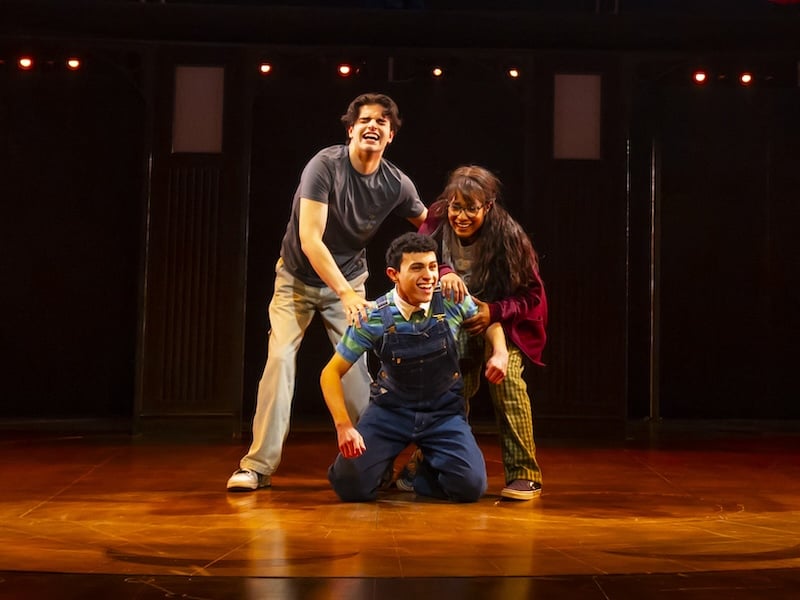
A Wrinkle in Time plays through July 20, 2025, in the Kreeger Theater at Arena Stage at the Mead Center for American Theater, 1101 6th St SW, Washington, DC. Tickets start at $69 plus applicable fees. Purchase tickets online, through the Sales Office by phone at 202-488-3300, Tuesday–Sunday, 12-8pm; or in person at the box office Tuesday–Sunday, 2 hours prior to a performance. Tickets are also available at TodayTix. Groups of 10+ may purchase tickets by phone at 202-488-4380.
Running Time: Two hours and 40 minutes, including one intermission.
Arena Stage’s many savings programs include “pay your age” tickets for those aged 35 and under; military, first responder, and educator discounts; student discounts; and “Southwest Nights” for those living and working in the District’s Southwest neighborhood. To learn more, visit arenastage.org/savings-programs.
The program for A Wrinkle in Time is downloadable here.
COVID Safety: Arena Stage recommends but does not require that patrons wear facial masks in theaters except in designated mask-required performances. For up-to-date information, visit arenastage.org/safety.
SEE ALSO:
Brave daughter saves dad in sumptuous new musical ‘A Wrinkle in Time’ at Arena (review by Sophia Howes, June 30)
Arena Stage announces cast and creative team for ‘A Wrinkle in Time’ (news story, May 2, 2025)

